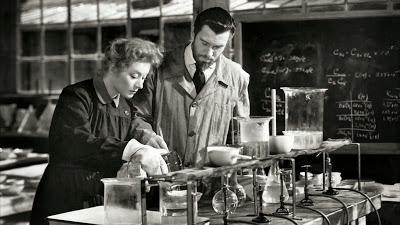Format: Turner Classic Movies on rockin’ flatscreen.

Don’t let the fact that I have degrees in English literature and linguistics color your opinion on what I’m about to say: I am a science geek. The vast majority of my reading for pleasure is connected to science in one way or another. I admit that I’m not much more than a dilettante when it comes to actual science, but I love it. Stories about science, about its importance and its benefits, are always interesting to me. So when Turner Classic ran Madame Curie, a film that I’ve had some difficulty tracking down, I was pretty interested.
The main point of Madame Curie as a film is to humanize our two main characters, Pierre (Walter Pidgeon) and Marie Curie (Greer Garson). We start with Marie’s days in college at the Sorbonne. She is young, talented, and dirt poor, and attracts the attention of one of her professors when she faints in class. The professor (Albert Bassermann) takes interest in Marie and offers her a position doing research on a particular question. Short on laboratory space, the professor convinces Pierre Curie to accept her into his lab, where she becomes a person of intense fascination to Curie’s lab assistant, David (Robert Walker).
Despite Curie’s initial objections, he grows to appreciate the intense and intelligent young woman in his lab. When he realizes that her graduation means that she will return to Poland to teach, he begins to panic. As a stop-gap, he invites her to spend a weekend with his parents (Henry Travers and Dame May Whitty), and in the course of the weekend, proposes to her. She agrees. This brings about her decision to work for her doctorate. She decides to study a question brought up earlier in the film concerning a mysterious type of radiation emanating from a piece of pitchblende. Over multiple years of painstaking, sometimes physically painful work, the pair expands the periodic table with the discovery of radium.
Let’s be honest, though. Even for a science nerd like me, watching a couple of people in fin de siècle Paris laying out bowls of water infused with a barium/radium mixture in the hopes of separating the two elements through evaporation and crystallization is hardly the stuff of gripping drama. Madame Curie is smart enough to actually infuse a little bit of tension into this process and also to go through it more or less in a couple of minutes of montage. A great deal of time is spent instead on the relationship between Pierre and Marie, which is where our attention should be.
I don’t want this to sound like the film gives short shrift to the incredible scientific advances made by the pair, because this is not the case. Instead, the film shows us their relationship and their discovery of radium through the context of their marriage and their love for each other. I’m impressed with how well the film seems to convey their relationship. Walter Pidgeon certainly appears a great deal older than Greer Garson, but he really wasn’t. In fact, the seven-year age difference between our principle actors comes close to matching the age difference of the real Pierre and Marie Curie.
It helps tremendously that Pidgeon and Garson worked well on the screen together. The pair made nine or so films together. Madame Curie was their second or third as an on-screen couple, but the chemistry (no pun intended) is already here. They work together on screen well, something that is enhanced in this film by Pidgeon playing Pierre Curie as both brilliant and socially awkward.
If there is a problem with Madame Curie it’s that this is a very slow film. The drama comes, literally, from water evaporating from a bowl at one point. Additionally, it’ is almost a foregone conclusion of what will happen. Many (and moreso at the time of the filming) will know that the Curies were awarded the Nobel Prize for physics in 1903. We know they discovered radium. So the moment when it appears that all of their work has gone for naught is less tension-filled than it should be.
But really, that’s the biggest issue here. Madame Curie is well-written and well-acted. It’s just not that exciting. This isn’t the sort of film you eat popcorn to and it was never intended to be that. It’s a good story, though, and worth seeing if only to understand the true level of sacrifice necessary sometimes for scientific advancement.
Why to watch Madame Curie: Because science kicks ass.
Why not to watch: It’s slow.
